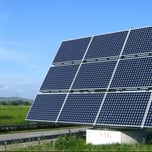- GreenMatch
- Blog
- The Opportunities of Solar Panel Recycling
The Opportunities of Solar Panel Recycling

Solar panel recycling plays a role in the energy sector because it tackles the environmental and economic issues linked to disposing of old solar panels. As the global energy installation continues to surge, many solar panels will reach their end-of-life stage in the coming years, resulting in waste.
Recycling these panels prevents substances from entering landfills and polluting our environment and presents an opportunity to recover valuable materials and create green job prospects. By recycling panels, we can conserve resources utilized in manufacturing new panels, easing supply chain limitations and reducing the need for raw material mining.
Solar Panel Recycling
The energy industry has been experiencing a radical change, and the gradual shift towards renewable energy sourcing is more than evident. Nevertheless, not all that looks sustainable stays that way upon the end of its life cycle. At least, that is the most common worry regarding photovoltaic (PV) solar panels. They are a sustainable energy source, dependent only on solar radiation, and capable of delivering electricity to our homes. However, what happens to solar panels when they fail to perform efficiently? Explore their journey through the recycling process in the infographic below:
![Recycling: A Solar Panels Life after Death [infographic]](https://cdn.greenmatch.co.uk/cdn-cgi/image/format=auto/2/2022/10/recycling-a-solar-panels-life-after-death.png)
If you would like to use this infographic on your website, use the embed code below:
The Lifetime of Solar Panels
How long do solar panels last? This is a question that most people have in mind when considering solar panels. According to studies, the life expectancy of solar panels is about 30 years before decommissioning.
During the life of photovoltaic panels, a 20 per cent decrease in power capacity might occur. Between the first 10 to 12 years, the maximum decrease in efficiency is 10 per cent, and 20 per cent when reaching 25 years. The majority of manufacturers guarantee these figures.
Still, experience shows that, in reality, the efficiency drops by merely 6 to 8 per cent after 25 years. The lifespan of solar panels may thus be much longer than officially stated. The lifespan of high-quality PV panels may reach 30 to 40 years and still be functional afterwards, though with decreasing efficacy.
Disposal of Solar Panels
From a regulatory aspect, PV panel waste still falls under the general waste classification. A sole exception exists at the EU level, where PV panels are defined as e-waste in the Waste Electrical and Electronic Equipment (WEEE) Directive. This directive and other legal frameworks thus regulate the PV panel waste management.
Solar cell manufacturers are bound by law to fulfil specific legal requirements and recycling standards to ensure that solar panels do not become a burden to the environment. That is when technologies to recycle solar panels started emerging.
Photovoltaic producers collaborated with governmental institutions and have devised a few ways to tackle solar waste.
Solar panel waste
If recycling processes were not implemented, 60 million tons of PV panel waste would lie in landfills by the year 2050; since all PV cells contain a certain amount of toxic substances, that would truly become a not-so-sustainable way of sourcing energy.
In the following interactive map, you can check out which countries produce the most solar panel waste:
The common belief that solar panels not being recyclable is, therefore, a myth. It is, however, a process that needs time to be widely implemented and requires further research to reach its full potential of adequately recycling all solar panel components. For that reason, designing and recycling units must collaborate closely so that mindful eco-designs ensure the ability to recycle.
Solar panel recycling processes
There are two main types of solar panels requiring different recycling approaches. Both types—silicon-based and thin-film-based—can be recycled using distinct industrial processes. Currently, silicon-based panels are more common, though that does not mean there would not be great value in the materials of thin-film-based cells.
Research studies conducted on the topic of recycling solar panels have resulted in numerous technologies. Some even reach an astonishing 96% recycling efficiency, but the aim is to raise the bar higher in the future.
Researchers and innovators are hard at work in the spirit of continuous improvement. They are exploring novel techniques, such as solvent-based recycling, which may improve efficiency and reduce material loss. Furthermore, artificial intelligence and robotics advancements are streamlining the sorting and disassembly processes, making recycling more efficient and cost-effective.
Silicon-based solar panel recycling
The recycling process of silicon-based PV panels starts with disassembling the product to separate aluminium and glass parts. Almost all (95%) of the glass can be reused, while all external metal parts are used for re-molding cell frames. The remainder of the materials are treated at 500°C in a thermal processing unit to ease the binding between the cell elements. Due to the extreme heat, the encapsulating plastic evaporates, leaving the silicon cells ready to be further processed. The supporting technology ensures that not even this plastic is wasted. Therefore, it is reused as a heat source for further thermal processing.
After the thermal treatment, the green hardware is physically separated. 80% of these can readily be reused, while the remainder is refined. Silicon particles—called wafers—are etched away using acid. Broken wafers are melted to be used again for manufacturing new silicon modules, resulting in an 85% recycling rate of the silicon material.
Thin-film-based solar panel recycling
In comparison, thin-film-based panels are processed more drastically. The first step is to put them in a shredder. Afterwards, a hammermill ensures that all particles are no larger than 4-5mm, where the lamination keeping the inside materials together breaks and, hence, can be removed. Unlike silicon-based PV panels, the remaining substance consists of solid and liquid material. A rotating screw separates these, which keeps the solid parts rotating inside a tube while the liquid drips into a container.
Liquids go through a precipitation and dewatering process to ensure purity. The resulting substance goes through metal processing to separate the semiconductor materials completely. The latter step depends on the technology used when producing the panels; however, 95% of the semiconductor material is reused on average.
Solid matter is contaminated with so-called interlayer materials, which are lighter in mass and can be removed through a vibrating surface. Finally, the material goes through rinsing. What is left behind is pure glass, saving 90% of the glass elements for easy re-manufacturing.
Solar panel recycling market
The market for recycling panels is still relatively new. Growing steadily. Researchers are actively developing recycling processes that can economically recover most of the components from a solar panel. Some countries have implemented design laws to ensure the recycling of PV panels, which will take effect in July 2025. Other countries are also focusing on addressing the management of PV waste.
The global solar panel recycling market is witnessing growth. In 2022, the market was valued at £250 million. It is projected to reach £1.29 billion by 2028. As the amount of panel waste continues to increase, recycling these panels can offer a source of materials that would otherwise need to be mined, thereby contributing to a more sustainable approach towards solar energy.
Currently, the state of solar panel recycling in the UK is relatively limited, with a few companies providing services and inadequate infrastructure to manage the rising volume of solar waste. Some notable firms offering recycling services in the UK include H&H Pro, ILM Highland and Recycle Solar Technologies.
The UK is estimated to generate 30,000 tonnes of waste over the next decade. Furthermore, there is an expected surge in panels hitting the market in the 2030s as older millennium-era solar panels begin to deteriorate.
This creates a demand for the panel recycling sector to expand its capabilities in managing the growing number of outdated panels and assisting in producing solar panels.
The future benefits of solar waste management
Now that we know that solar panels can be recycled, the question is what other benefits it brings to the economy—if any. A proper solar panel recycling infrastructure must be established to manage the large volumes of PV modules that will be disposed of shortly. Once that is in place, we’ll witness several positive factors and new economic opportunities.
PV recycling will create more green job opportunities and approximately £11 billion in recoverable value by 2050. This influx will make producing 2 billion new panels possible without investing in raw materials. This means there will be the capacity to produce around 630 GW of energy from reusing previously used materials.
Thanks to constant solar panel price drops, more and more households and businesses choose to invest in solar power systems. As a result, even more economic opportunities in the solar cell recycling sector will emerge.

Attila was the Front-End Developer at GreenMatch. He holds a degree in international marketing and has several years of experience in web development and user experience. Attila likes to write about solar energy, heating technology, environmental protection, and sustainability. His and his team’s articles appeared in well-known sites such as The Conversation, Earth911, EcoWatch, and Gizmodo.
 We strive to connect our customers with the right product and supplier. Would you like to be part of GreenMatch?
We strive to connect our customers with the right product and supplier. Would you like to be part of GreenMatch? 



